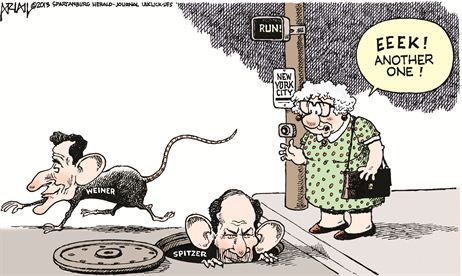It’s Friday, July 12th, 2013…and here’s The Gouge!
First up, it’s the inimitable Ann Coulter’s take on what she terms…
This Year’s Duke Lacrosse Case

This week, instead of attacking a Hispanic senator, Marco Rubio, I will defend a Hispanic citizen, George Zimmerman, on trial for the murder of Trayvon Martin. (Zimmerman would make a better senator.)
It’s becoming painfully obvious why no charges were brought against Zimmerman in this case — until Al Sharpton got involved. All the eyewitness accounts, testimony, ballistics and forensics keep backing up Zimmerman. We should send a big, fat bill for the whole thing to Sharpton, courtesy of MSNBC.
With the prosecution’s witnesses making the defense’s case, the inquisitors’ last stand is to claim that, if the races were reversed, the black guy would have been instantly charged with murder. As explained in The New York Times:
“Had Mr. Martin shot and killed Mr. Zimmerman under similar circumstances,black leaders say, the case would have barreled down a different path: Mr. Martin would have been quickly arrested by the Sanford Police Department and charged in the killing, without the benefit of the doubt.” (Also, CNN could have dropped the “white” and referred to Zimmerman exclusively as “Hispanic.”)
The people who say this are counting on the rest of us being too polite to mention that it is nearly impossible to imagine such a case in a world where half of all murders and a majority of robberies are committed by blacks. To reverse the races with the same set of facts, first, we’re going to need a gated, mixed-race community, similar to the Retreat at Twin Lakes, that has recently experienced a rash of robberies by white guys. The only way to do that is to enter “The Twilight Zone.”

There were at least eight burglaries in the 14 months before Zimmerman’s encounter with Martin. Numerous media accounts admit that “most” of these were committed by black males. I’m waiting to hear about a single crime at Twin Lakes that was not committed by a black male.
Just six months before Zimmerman’s encounter with Martin, two men had broken into the home of a neighbor, Olivia Bertalan, while she was alone with her infant son. She had just enough time to call 911 before running upstairs and locking herself in a room. The burglars knew she was home, but proceeded to rob the place anyway, even trying to enter the locked room where she held her crying child. Bertalan had seen the burglars just before they broke into her house — one at the front door and one at the back. They were young black males. They lived in the Retreat by Twin Lakes.
In another case, a black teenager strode up to Zimmerman’s house and, in broad daylight, stole a bicycle off the front porch. The bike was never recovered. Weeks before Zimmerman saw Martin, he witnessed another young black male peering into the window of a neighbor’s house. He called the cops, but by the time they arrived, the suspect was gone.
A few days later, another house was burglarized. The thieves made off with jewelry and a new laptop. Roofers working across the street had seen two black teenagers near the house at the time of the robbery. When they spotted one of the teens the next day, they called the police.

This time, the roofers followed the suspect so he wouldn’t get away. The cops arrived and found the stolen laptop in his backpack. This was the same black teenager Zimmerman had seen looking in a neighbor’s window.
The only reason it’s hard to imagine the Zimmerman case with the races reversed is that it’s hard to imagine a white teenager living in a mixed-race, middle-class community, mugging a black homeowner. This is not a problem of society’s reactions, but of the facts.
There is, however, at least one case of a black homeowner fatally shooting a white troublemaker. He was not charged with murder.
In 2006, the ironically named John White was sound asleep at his nice Long Island home when his teenage son woke him to say there was a mob of white kids shouting epithets in front of the house. The family was in no imminent danger. They could have called 911 and remained safely behind locked doors. But White grabbed a loaded Beretta and headed out to the end of the driveway to confront the mob. A scuffle ensued and White ended up shooting one of the kids in the face, killing him.

If you’re wondering who the Feminazi on the right might be, it’s one “Tara Levicy, the nurse who reported on the condition of Crystal Mangum after the alleged rape, shrugged off the absence of physical evidence of assault and the lack of lacrosse-player DNA with a feminist slogan: ‘Rape is about power, not passion.'”
White was charged and convicted only of illegal weapons possession — this was New York, after all — and involuntary manslaughter. He was sentenced to 20 months-to-four years in prison, but after serving five months was pardoned by Gov. David Paterson.
With all due compassion for the kid who was killed, the public was overwhelmingly on the father’s side — a fact still evident in Internet postings about the case. The kids were punks menacing a law-abiding homeowner. Even the prosecutor complained only that Paterson hadn’t called the victim’s family first. The local NAACP had campaigned aggressively on White’s behalf. There were no threats to riot in case of an acquittal.
The centerpiece of White’s self-defense argument was his recollection of his grandfather’s stories about the Ku Klux Klan. George Zimmerman’s memory of young black males committing crimes at Twin Lakes is somewhat more recent.
John White wasn’t jumped, knocked to the ground, repeatedly punched, and his skull knocked against the ground. He wasn’t even touched, though he claimed the white teen was lunging at him. Talk about no reason to “follow,” there was no reason for him to leave the safety of his locked home. White’s son knew the kids by name. They could have waited for the cops.
So, yes, this case probably would be very different if Zimmerman and Martin’s races were reversed. It is only when the victim is black that we must have a show trial, a million-dollar reward paid to the victim’s parents and the threat of riots.
Question: how many of you knew the extent of the recent rash of burglaries and incidents involving young black males in Zimmerman’s gated-community prior to the death of The Obamao’s long-lost son? And how many ever even heard about the John White shooting?!? We rest our case.
George Zimmerman…the Duke lacrosse players…Tawana Brawley…


…are we the only one detecting a pattern here?!?
By the way, we’re not saying Zimmerman’s innocent; we’d just like to see the legal system run its course prior to him being convicted.
Next up, Commentary Magazine‘s Jonathan Tobin offers his thoughts on Sarah Palin’s recent suggestion she may throw her hat in the ring for the Alaskan senate seat:
Run, Sarah, Run and Keep Running

Was Sarah Palin just teasing us last night when she let drop on Sean Hannity’s Fox News show that she was considering running for the U.S. Senate next year? Maybe. Palin, as Politico notes today, will generally do or say anything in order to create some buzz in the media. It’s hard to find too many serious political observers who think that four years after she abruptly resigned her post as governor of Alaska, the 2008 Republican vice presidential candidate is willing to do the hard work of running for office rather than just running her mouth on television. Nor would it seem likely that she would put her celebrity status in jeopardy by running the risk of being defeated, either in a primary or in a general election.
But, at least for the sake of argument, let’s take her at her word and say that she really is considering challenging incumbent Democrat Mark Begich in 2014. If so, my advice to her is that she should do it.
Doing so might not be the safest play for preserving her “brand” as a pundit at least in the short term since it would take her off of television and the lecture circuit and possibly bring her career as a bankable personality to a premature end. Nor would it necessarily be what Senate Republicans want to happen since they would probably prefer a less controversial mainstream conservative to be the GOP nominee in a race for what ought to be a winnable seat for the party. But if Palin really wants to have an impact on the future of her party and her country and to revive her flagging popularity and chances for a future presidential run, trying for the Senate in 2014 is the only choice.

After four years as the queen of conservative snark, it’s hard to remember that once upon a time, Palin was one of the bright, young stars of the Republican Party with a hard-won reputation as a fresh, independent voice that was willing to challenge a corrupt state party establishment. That Sarah Palin was not so much an ideologue as she was a doer. Perhaps if John McCain had not listened to those conservative pundits who swooned over Palin’s obvious political talent and good looks and made her his personal Hail Mary play to transform a 2008 presidential election that he was bound to lose anyway, she might now be in the middle of a second successful term as Alaska governor and be one of the GOP’s favorites for 2016. A few more years in Juneau being a good governor and a careful rollout of her national profile in which she could portray herself as conversant on national issues would probably have been the best thing for her career, as well as for her family.
But that was not to be. Palin made a powerful first impression on the country with as brilliant a convention speech as could have been imagined, but soon crashed and burned in national interviews and, unfortunately, became the scapegoat for a poorly run McCain campaign as well as the primary focus for left-wing hate and liberal media bias. In the next year, she ditched her governorship and then proceeded to make a spectacle of herself on reality TV. The worst of it wasn’t so much her poor career choices and the way her family became a tabloid staple. The most dispiriting thing about Palin’s career arc is the way her bitterness at the media and other Republicans became the primary focus of her rhetoric. Rather than going to school on the issues and making herself ready for the next political challenge, she seemed content to become a sideshow for the grass roots, pandering to the worst instincts of her party and often appeared foolish rather than being a thoughtful contributor.
To note this unfortunate descent is not to ignore her still potent ability to generate publicity and draw crowds. Her interventions in some Republican primaries helped conservatives like Ted Cruz and Kelly Ayotte (Is Tobin talking about the same Kelly Ayotte WE know?!?) win Senate seats. Her raw political talent and speaking ability is still there even if it is most often used to rail at her enemies rather than to demonstrate thoughtful stands on the issues.

Doing so has kept her admirers happy and preserved her niche as a flame-throwing snark machine of the right. But she has to know that this routine has a limited shelf life. With the GOP now possessed of a deep bench of stars who are potential 2016 candidates, Palin is very much yesterday’s news and has already been eclipsed by people like Cruz and Rand Paul even among her own fan base. As the years go by, her appeal and her celebrity are bound to wane. Sooner or later, if she is to go on being treated–at least by people like Hannity, if few others even in the conservative media–as a big deal, she’s going to have to do something more than talk shows. The 2014 Alaska Senate race may be the best opportunity to do so that she will ever get.
That said, Palin would have to do more than merely throw her hat in the ring to beat Begich. As one poll taken earlier this year made clear, even in Alaska her negative poll ratings are through the roof as much as they are nationally. The fact that a staggering 59 percent of Alaskans view her negatively with only 35 percent seeing her in a positive light might be enough to deter her—or any rational politician—from running. But it’s not as if any of the other likely Republican senatorial candidates look to be doing much better. In particular, the prospect of Tea Party favorite Joe Miller taking another try at the Senate isn’t scaring Begich. Miller beat Lisa Murkowski in a 2010 GOP primary but then lost the general election to her when she ran as an independent, and he isn’t likely to do much better this year. And while Begich has decent poll numbers, he is still a Democrat running in an overwhelmingly Republican state. Moreover, everyone knows that prosecutorial misconduct that helped convict the late Ted Stevens on corruption charges is the only reason Begich is currently sitting in the Senate.
A Senate campaign would put her to the test and even her sternest critics should not assume she would fail this time. It may be that Palin has become too polarizing a political personality to win any election, even in deep red Alaska. But she owes to herself and to her supporters to try. She almost certainly will never be president, but a Senate seat is not beyond her grasp. While I’m far from sure that her contribution to the national debate would be enlightening, it would be entertaining.
If she does decide to run, all we suggest is extensive diction lessons and a crash course on current events, economics, foreign affairs…and geography!
Meanwhile, back in the cesspool that is Washington, D.C., the WSJ‘s Kimberly Strassel warns of…
Another IRS Scandal Waiting to Happen
Federal Elections Commissioner Donald McGahn wants to rein in the bureaucracy of this sensitive agency. The political left is furious.

The Obama administration claims it wants to ensure that the rank political abuse perpetrated by the Internal Revenue Service is never repeated. Ask Donald McGahn how that’s going.
Mr. McGahn is a Republican appointee to the Federal Election Commission, an agency with every bit as much potential for partisan meddling as the IRS. Due to leave the agency soon, Mr. McGahn’s parting gift is a campaign to rein in an out-of-control FEC bureaucracy. But the left is fighting that oversight and is determined to keep power in the hands of unaccountable staff.
The FEC was created in the wake of Watergate, in part to remove primary power over political actors from the Justice Department. It sports an equal number of Democratic and Republican commissioners, so that neither side can easily impose a partisan agenda. This means a lot of deadlocks, a situation that infuriates the left, which prefers a fire-and-brimstone regulator.
It also frustrates the FEC’s staff, which has responded by going around the commissioners. (They’ve obviously learned by example!) The Federal Election Campaign Act (FECA), for instance, makes it clear that staff may not commence investigations until a bipartisan majority (four members) of the commission votes that there is a “reason to believe” a violation has occurred. In theory, this provision should guard against IRS-like witch hunts.

Except that over the years staff have come to ignore the law, and routinely initiate their own inquiries—often on little more than accusations they find on blogs or Facebook. For a sense of how these investigations can go off the rails, consider that Lois Lerner—before serving as the center of today’s IRS scandal—was the senior enforcement officer at the FEC. A Christian Coalition lawyer has testified that during a (sanctioned) FEC investigation in the 1990s—in addition to generating endless subpoenas, depositions and document requests, Ms. Lerner’s staff demanded to know what Coalition members discussed at their prayer meetings and what churches they belonged to. Once staff gets rolling, there is little to stop them.
More troubling to some FEC commissioners has been the staff’s unsanctioned and growing ties to the Obama Justice Department. In September 2011, Tony Herman was named FEC general counsel. Mr. Herman in early 2012 brought in Dan Petalas, a Justice prosecutor, as head of the agency’s enforcement section. FECA is clear that a bipartisan majority of commissioners must vote to report unlawful conduct to law enforcement. Yet FEC staff have increasingly been sending agency content to Justice without informing the commission.
For instance, when a complaint is filed with the FEC against a political actor, the general counsel is required to write a report for the commissioners on whether there is a “reason to believe” the actor committed a violation. This report is confidential and never made public until a case is closed. Yet FEC staffers have sent these reports to Justice, in one case before the report was considered by the commissioners.
In a June memo, Mr. Herman defended staff supremacy with the astonishing argument that big decisions are best made by “non-partisan, career leadership.” (No joke.) That way, the commission is shielded from “claims that it is deciding whether to assist DOJ criminal prosecutions” on the basis of “political considerations.” Better, apparently, to keep the public completely in the dark.

Trust them; they know what’s best for you!
These ties are disturbing, since the Obama campaign pioneered the tactic of demanding that Justice pursue criminal investigations of its political opponents as a means of intimidation. The FEC’s info-funneling to Obama Justice raises the obvious question of whether Obama Justice wasn’t in turn influencing FEC reports. (It also raises another question: If Justice had this kind of pipeline to the FEC, did it have one to the IRS?)
These questions are why election law requires bipartisan diligence over investigations and information sharing. Mr. McGahn is attempting to right the ship by getting the commission to adopt a new enforcement manual that would require uniform procedures. Yet FEC Chairman Ellen Weintraub has been uncharacteristically quiet on the issue, and liberal groups such as the Center for American Progress (via its Think Progress blog) have launched howling accusations that Mr. McGahn is trying to “block enforcement” and “weaken the agency.” Some have suggested he’s trying to ram through the change while the commission has a temporary 3-2 Republican majority.
In fact, Mr. McGahn hasn’t forced this issue, because he’s intent on getting all his colleagues to stand up for institutional responsibility. He’s made clear he’s not trying to end the relationship with the DOJ, or to stop investigations. As he told me this week, the only question is who will make the decisions: “The presidentially appointed, Senate-confirmed commissioners who answer to the public, or an unaccountable staff?”
The left wants the latter, since it provides more latitude to use the FEC to their political ends. This has worked to their benefit at agencies like the (currently illegitimate) National Labor Relations Board, where (Acting) General Counsel Lafe Solomon is single-handedly running U.S. labor policy, much to their liking.
But Americans, and the FEC commissioners, need only recall our recent experience of letting federal employees meddle in politics. Mr. McGahn deserves great credit for trying to avoid the potential for another IRS scandal. Let’s see if the Obama team is just as serious.
No seeing necessary; the only thing about which Team Tick-Tock’s serious is the Marxification of America.

And in a follow-up to yesterday’s Cover Story regarding Eliot Spitzer’s parlous personality, the Journal detailed the recollections of Michael Aronson, who recorded his experience with the former New York governor in the March 26, 2008 edition of the Daily News:
Spitzer was a frequent guest around the Daily News Editorial Board in the mid-1990s. . . . In the 1998 general election [for attorney general] Spitzer was dogged by questions about how he financed his ’94 and ’98 campaigns. In a visit to our offices, I asked him about a loan he was using as funding. He claimed the large bank loan paid for both campaigns.
A few days later, the lie was exposed. His rich father, not any bank, had in 1994 paid off that year’s campaign debts with a loan of millions of dollars to his son—one that was due 10 years down the road. Spitzer even handed out copies of the once-secret promissory note detailing his loan from Dad.
The News denounced Spitzer for his violation of the spirit of campaign finance laws and for lying so blatantly about it. We endorsed his opponent, but Spitzer narrowly won. After his victory, he came in to meet with us and said he had lied about the money from Dad “because there are some personal financial relationships that I don’t like to get into.” As the whole world knows by now.
When I sarcastically complimented him for successfully evading the financing law, the attorney general-elect said, “The law is porous.” Since then, I often imagined how prosecutor Spitzer would have looked upon some Wall Streeter trying that as an excuse.
“Porous”…like Der Obafuhrer’s view of the…

Since we’re on the subject of those who feel the rule of law simply doesn’t apply to them…
Democratic aide brings gun into courthouse, receives ticket

An aide to Michigan Democratic Rep. John Conyers got off with a warning after illegally bringing a gun into a public building.
Security officers at a federal building in downtown Detroit found a gun in the purse of Betty Petrenz, Conyers’ office manager. Bringing weapons into government buildings is strictly forbidden, but Petrenz received no sentence or formal punishment. Just a ticket, which will be stricken from her record if she demonstrates good behavior.
Conyers is a strong advocate of stronger gun control laws whose votes have earned him an “F” grade from the National Rifle Association.
Just for the…no pun intended…”record”, Conyers’ is in jail for bribery, his son took a government SUV for a joyride and stole several laptops, and now his aide has attempted to illegally bring a weapon into a federal building; would anyone REALLY be surprised to learn the Dishonorable Gentleman represent the good people of Detroit?!?

On the Lighter Side…








Then there’s this bit of Naval lore from Balls Cotton…

…as well as this little bon mot forwarded by Jeff Foutch:

Finally, we’ll call it a day with News of the Bizarre, courtesy of Drudge:
Madonna to be discussed at Polish exorcists meeting
Madonna will feature on the agenda of a secretive five-day meeting of European exorcists in Poland.

Long the scourge of the Catholic Church, Madonna has often triggered Christian ire, once going through a mock crucifixion during one her stage shows. Now her music and shows will come under the scrutiny of priests trained in the art of defeating demons, treating satanic possession and looking for the devil in a section of the conference dedicated to finding evil in popular culture.
“Part of the conference is dedicated to the hidden subliminal message in communication, and the choice of this subject was inspired by the woman who dares to call herself Madonna,” said Father Andrzej Grefkowic, an exorcist and one of the organisers of the conference. “We’ve been worried about her concerts.”
Hell bells; if the good Father thinks her music is bad, he should try watching one of her movies!
Magoo




























You must be logged in to post a comment.